lesson_79
新概念英语第二册lessonLesson79Byair-2023年学习资料

New words-·Parent n.父母亲-·亲生父母-birth parent-·养父母 foster parent-·单亲父母-single parent-•结婚后他仍和父母住在一起 -.After marriage he still lived with his parent .-•她的父母替她照看孩子。-.Her parents took care of the ba y for her.-•我的父母曾经住在南美洲,所以假期里我常从欧洲乘飞机到他-们那里-.My parents used to live in South America and I use to fly there-from Europe in the holidays.
Lesson 79-By air
·和飞机有关的短语和词汇-乘飞机-by air-空中乘务员-flight attendant机起飞-take off-飞机降落-land landing-飞机上升-gain height 飞机下降-descend-飞机着陆-touch down landed-上飞机-get on he plane-下飞机-get off the plane-在飞机上-on board-国内 航空-domestic/international-非直航-direct/indirect-定 取消/错过航班-book/cancel/miss the
·Be frightened of sth-习惯性的害怕-·他害怕打雷-He is frigh ened of thunder.-Be frightened to do sth-害怕做某事她害怕在黑暗中看到人影-She is frightened to see a figure i the dark.-·她害怕黑暗中可能有鬼-She was frightened that here might be a ghost in the dark.-。-frightenin adj.令人恐惧的-It was a very frightening experience and they were very courageous.-那是一次非常令人恐惧的经历,但他 非常勇敢。-0-frighten vt.使惊恐vi.害怕-He knew that Soli as trying to frighten him,so he smiled to hide is fear.-他知道索利想吓唬他,因此微笑着掩饰自己的恐惧。-Don't put your prices too high or you'll frighten the customer off.-要价别太高,否则os-Check-in desk-check your tic et-pay foree-XINHUA-check your passport-passpor control-give you a boarding card-.5T78,0阳中国收聚热 -中事人民养和国-中南人钢-CAAC-中华人民兴和国-照-批表路沸-登机牌boarding c rd-长号凡.拉等-通行证-251
新概念英语二习题Lesson-79-80

新概念英语2Lesson 79 By Air 乘飞机I. 语法与词汇知识1. I used to ______ by train a lot when I went to visit my aunt in the countryside.A. travelingB. travelC. traveledD. travels2. My mother told me that I can ______ charge of my pocket money.A. takeB. holdC. getD. have3. The plane was flying low ______ my head, so I could see it clearly.A. uponB. ontoC. overD. up4. Everybody ______ board worried about the delay.A. InB. atC. intoD. on5. My father is used to ______ up early in the morning for exercises.A. gettingB. getC. getsD. gotII. 连词组句:请将下列词重新排序后组成一个句子,每个词只能用一次6. traveling , air , fast , is , by , safe , and____________________________________________________________.7. the , big , when , boy , little , he , frightened , saw , felt , the , dog____________________________________________________________.8. luggage , are , on , be , passengers’ , board , they , must , checked , before____________________________________________________________.9. I , an , that , experience , last , unpleasant , had , year , in , city____________________________________________________________.10. You , better , the , calm , before , keep , examination , had____________________________________________________________.III. 阅读理解Few animals besides monkeys have hand-like paws. The monkey, like man, has an opposable thumb (大拇指) —that is, it can place its thumb opposite its other fingers. By pressing its first finger against its thumb a monkey can pick up things as tiny as a flea (跳蚤). Because other animals lack this kind of thumb, it is difficult for them to pick up small things and carry them. The monkey’s ability to grasp rice with its paw often leads to its capture. Hunters put some rice inside a coconut, leaving a hole in the shell of the nut. The monkey has no trouble sliding its paw through the hole. But it can’t draw the paw out while it is holding the rice with its paw. Since it isoften too stupid or greedy to open its hand, the monkey is unable to free itself from this simple trap (圈套).11. According to the passage, not many animals have ______.A. handsB. paws with thumbsC. paws without nailsD. paws12. An opposable thumb is a thumb that can ______.A. pick up thingsB. be placed against the other fingersC. press against the opposite thumbD. press against anything13. A monkey can pick up small objects by pushing its thumb against ______.A. one of its fingersB. all its fingersC. its pawD. the objects14. Hunters can catch monkeys by a coconut trap because monkeys ______.A. are too greedy for the coconut they have foundB. have trouble finding out the riceC. usually keep their paws closed to hold the riceD. like to eat rice but not the coconutIV. 翻译15. take charge of ___________________________16. touch down ___________________________17. turn round ___________________________18. a flight attendant ___________________________19. on board ___________________________20. 他过去喝酒很厉害,但他已经戒了。
新概念2_lesson_79_By_air
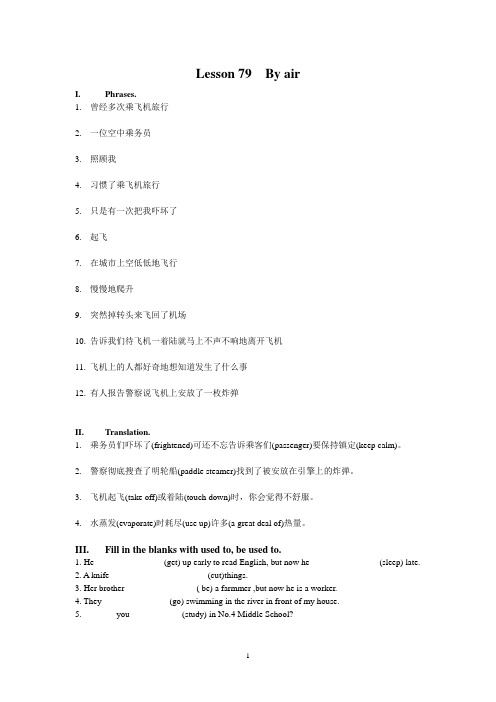
Lesson 79 By airI.Phrases.1.曾经多次乘飞机旅行_____________________________________________________________________2.一位空中乘务员_____________________________________________________________________3.照顾我_____________________________________________________________________4.习惯了乘飞机旅行_____________________________________________________________________5.只是有一次把我吓坏了_____________________________________________________________________6.起飞_____________________________________________________________________7.在城市上空低低地飞行_____________________________________________________________________8.慢慢地爬升_____________________________________________________________________9.突然掉转头来飞回了机场_____________________________________________________________________10.告诉我们待飞机一着陆就马上不声不响地离开飞机_____________________________________________________________________11.飞机上的人都好奇地想知道发生了什么事_____________________________________________________________________12.有人报告警察说飞机上安放了一枚炸弹_____________________________________________________________________II.Translation.1.乘务员们吓坏了(frightened)可还不忘告诉乘客们(passenger)要保持镇定(keep calm)。
新概念第一册第79课

他们周一看的牙医. They saw the dentist on Monday. 他三月份买的汽车. He bought the car in March. 她是10月1日遇到他的. She met him on October 1st.
5
难道我不能现在见牙医吗? Can’t I see the dentist now? 你难道不是一名学生吗? Aren’t you a student? 难道他不爱她吗? Doesn’t he love her?
6
•shopping [‘ʃɔpɪŋ]
•list
[list]
•vegetable [':d]
•hope
[həup]
•thing
[θiŋ]
•money ['mʌni]
n. 购物 n. 单子 n. 蔬菜 v. 需要 v. 希望 n. 事情 n. 钱
If you want to buy a lot of things in the supermarket,but you can`t remember clearly,what will you do to make sure you remember clearly?
2019/8/5
蓓蕾D2班学生名单 Name list
Lisa
Tommy
Amy1
Charlie
Amy2
Kara
Ann
Chris
Hanks
Carl
Edwin
2. vt.及物动词 (1)把...编列成表,把...编入 目录 Mother listed the things she wanted to buy. 母亲把她想买的东西列出清 单。 (2)列举 The reasons are listed.
新概念第一册lesson-79

New words and expressions
Listen to the tape then answer this question:
What is Carol not going to buy?
Language Points
TOM: What are you doing, Carol? CAROL: I'm making a shopping list, Tom.
12
时态造句:
1. 我每个星期日写购物单。 2. 我爸爸每个星期六写购物单。 3. 他们昨天写了购物单。 4. 学生们正在写购物单。 5. 你必须为我写份购物单。 6. Linda可以为你写份购物单。 7. 我们打算写购物单。
Lesson 80
I must go to the …
New words and expressions
g否ro定ce句r’s中:表su示ga“r, 和ja”m,,ch要e用es“e, obru”tte代r,替ho“naeny,db”is。cuit I like reading and dancing, but I don’t like singing or
dancing.
TOM: What about vegetables? CAROL: I must go to the greengrocer's. greengroWceer’sh:atvomenat'ot,gpoottamto,acnabybtaogme, alettoueces,,pea,
Pattern Drill
1. Have you got any cheese?
2. I need a lot of cheese.
3. I haven’t got much.
新概念第一册Lesson-79-80知识点和拓展
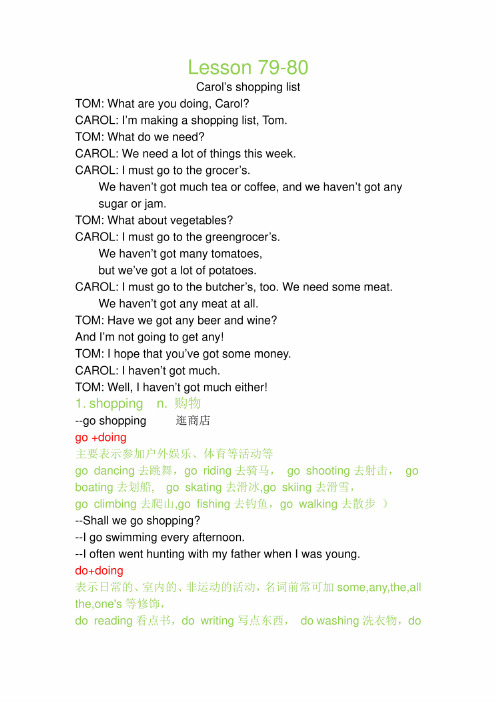
Lesson79-80Carol's shopping listTOM:What are you doing,Carol?CAROL:I'm making a shopping list,Tom.TOM:What do we need?CAROL:We need a lot of things this week.CAROL:I must go to the grocer's.We haven't got much tea or coffee,and we haven't got anysugar or jam.TOM:What about vegetables?CAROL:I must go to the greengrocer's.We haven't got many tomatoes,but we've got a lot of potatoes.CAROL:I must go to the butcher's,too.We need some meat.We haven't got any meat at all.TOM:Have we got any beer and wine?And I'm not going to get any!TOM:I hope that you've got some money.CAROL:I haven't got much.TOM:Well,I haven't got much either!1.shopping n.购物-go shopping逛商店go+doing主要表示参加户外娱乐、体育等活动等go dancing去跳舞,go riding去骑马,go shooting去射击,go boating去划船,go skating去滑冰,go skiing去滑雪,go climbing去爬山,go fishing去钓鱼,go walking去散步)-Shall we go shopping?-I go swimming every afternoon.--I often went hunting with my father when I was young.do+doing表示日常的、室内的、非运动的活动,名词前常可加some,any,the,all the,one's等修饰,do reading看点书,do writing写点东西,do washing洗衣物,dosewing缝补衣服,do eleaning搞卫生,do shopping购物do cooking做饭-We do shopping every Sunday.-Mom does cooking everyday.--She spends her money quickly.She does too much shopping.-I always try to do some reading when I am free.-Who does the cleaning in your house?--My father never does cooking.-He was doing some reading when I went in.--Have you done any writing lately?--She did the cleaning all by herself.-She did all the cleaning alone.2.list n.单子--I need a list of your names.我需要你们的一份名单。
新概念一79课课文

新概念英语第一册第79课的课文Lesson 79: A famous clockVocabulary:1. minute: 分钟2. hour: 小时3. face: 脸,表面4. hand: 手,指针5. show: 显示6. tell: 告诉7. pass: 经过8. past: 过去9. half: 半,一半10. past half past: 过半点11. to: 到达12. o'clock: 点钟Text:There is a famous clock in a city. It is in a tall, old building. The clock has a big face and three hands. The long hand shows the hours, the short hand shows the minutes, and the little hand shows the seconds.The clock tells the time very accurately. It passes a minute every minute, and passes an hour every hour. It passes a minute past half past every half past.People like to watch the clock because it is very interesting. They like to see the hands move and to hear the clock strike the hours.People also like to tell the time to each other. They say, "It is half past six o'clock." or "It will be seven o'clock in ten minutes."In the city where the famous clock is, there is a big church. The church tower is next to the tall, old building where the clock is. The clock shows the time to the people in the church. The people in the church can hear the clock strike the hours.In the city where the famous clock is, there is a big park. The park is near the tall, old building where the clock is. The clock shows the time to the people in the park. The people in the park can hear the clock strike the hours.In the city where the famous clock is, there is a big bank. The bank is near the tall, old building where the clock is. The clock shows the time to the people in the bank. The people in the bank can hear the clock strike the hours.In the city where the famous clock is, there is a big hotel. The hotel is near the tall, old building where the clock is. The clock shows the time to the people in the hotel. The people in the hotel can hear the clock strike the hours.The famous clock in the city is very useful. It helps the people in the city to know the time accurately. It also makes the city more interesting and beautiful.。
新概念第一册L79_80
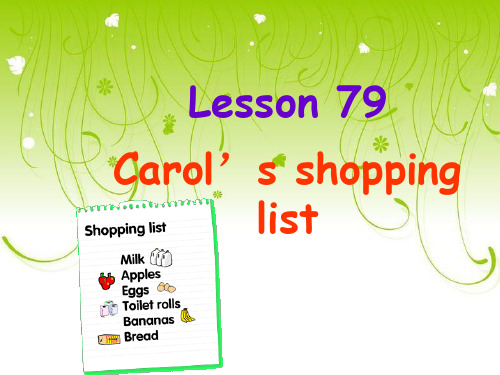
(2)need 做实义动词
有人称、数量及时态上的变化,疑问句中也需 用助动词do; • need to 在肯定句中,need后只跟动词不定 式,不跟动词原形。
• He needs some money. 他需要一些钱。 • I need to go home. 我要回家。 • What do they need this week?
!
TOM: What are you doing, Carol? CAROL: I'm making a shopping list, Tom. TOM: What do we need? CAROL: We need a lot of thing this week. CAROL: I must go to the grocer's. We haven't got much tea or coffee, and we haven't got any sugar or jam. TOM: What about vegetables? CAROL: I must go to the greengrocer's. We haven't got many tomatoes, but we've got a lot of potatoes. CAROL: I must go to the butcher's, too. We need some meat. We haven't got any meat at all. TOM: Have we got any beer and wine? And I'm not going to get any! TOM: I hope that you've got some money. CAROL: I haven't got much. TOM: 2020/1/3 Well, I haven't got much either!
新概念英语第一册Lesson-79-80-练习题无答案

L e s s o n79a n d L e s s o n801.W h e n y o u w a n t t o b u y s o m e t h i n g s,y o u m u s t m a k e a___________f i r s t.2.T h e r e a r e a___________o f a p p l e s i n t h e r e f r i g e r a t o r.3.Y o u c a n g e t s o m e___________a t t h e g r o c e r’s.4.W e h a v e n’t___________a n y v e g e t a b l e s a t a l l.5.H e h a s n o e a r s___________e y e s.6.M u s t I t a k e a b u s t h e r e N o,y o u___________.7.T e a c h e r s___________t h a t t h e i r s t u d e n t s a l l s t u d y w e l l.8.W e h a v e n’t___________w i n e,b u t w e h a v e a l o t o f b e e r.9.I m u s t g o t o t h e s t a t i o n e r’s t o g e t s o m e___________.10.Y o u c a n g e t s o m e m e d i c i n e a t t h e___________.二用所给词的适当形式填空(10分)1.I m u s t g o t o t h e___________(n e w s a g e n t)t o g e t s o m e w r i t i n g p a p e r.2.C a r l i s m a k i n g a___________(s h o p)l i s t.3.S h e h a s n’t___________(g e t)m u c h t e a o r c o f f e e.4.W h a t a b o u t___________(v e g e t a b l e)5.T h e y d o n’t h a v e___________(m a n y)m i l k.6.Y o u c a n g e t s o m e___________(g r o c e r)a t t h e g r o c e r’s.7.I l i k e___________(c h e m i s t)b e s t o f a l l t h e s u b j e c t s.8.T h e r e i s a l o t o f___________(s t a t i o n e r)a t t h e s t a t i o n e r s.9.T h e d e s k i s b r o k e n.I t n e e d s___________(n e e d).10.H e r e i f a c a r d f o r y o u w i t h o u t b e s t___________(w i s h).三用所给动词的适当形式填空(10分)1.Y o u n e e d___________(t a k e)a b u s t h e r e.2.W e n e e d n’t___________(w o r k)l i k e t h a t.3.W e a b o u t___________(b u y)s o m e v e g e t a b l e s.4.I’m s o r r y f o r___________(m i s s)t h e a p p o i n t m e n t.5.I m u s t g o t o t h e b u t c h e r’s___________(g e t)s o m e m e a t.6.I w i s h___________(v i s i t)C h i n a n e x t y e a r.7.H e h o p e s___________(b e)a d o c t o r.8.T h e r o o m n e e d s___________(p a i n t).9.I h o p e t h a t y o u h a v e___________(g e t)s o m e m o n e y.10.M r.C r o f t___________(h a v e)a t e r r i b l e t o o t h a c h e l a s t S u n d a y.四用方框内提供的短语填空(10分)1.Y o u c a n g e t s o m e g r o c e r i e s___________.2.2.M r s.W i l l i a m s b o u g h t s o m e b e e f___________.3.T h e r e a r e a l l k i n d s o f v e g e t a b l e s a n d f r u i t s___________.4.Y o u r h a i r i s l o n g.Y o u c a n h a v e a h a i r c u t___________.5.Y o u c a n s e e a d e n t i s t___________.6.Y o u n e e d t o g e t s o m e b u t t e r,c h e e s e a n d m i l k___________.7.T h e y s e l l m e d i c i n e___________.8.I m u s t g o a n d g e t s o m e p e n c i l s___________.9.B r e a d s m e l l s n i c e___________.10.D i d y o u b u y t o d a y’s n e w s p a p e r___________五选择填空(15分)()1.I c a n’t d o i t,s o I___________y o u r h e l p.A.n e e dB.n e e d n’tC.d o n’t n e e dD.a m n e e d()2.M u s t I c l e a n t h e c l a s s r o o m n o wN o,y o u________.A.n e e d n’tB.m u s t n’tC.c a n’t D d o n’t()3.W e n e e d y o u___________u s.A.h e l pB.h e l p i n gC.t o h e l pD.h e l p s()4.I m u s t g o t o___________t o b u y s o m e___________.A.t h e b u t c h e r’s,m e a tB.t h e c h e m i s t’s,g r o c e r’sC.t h e g r o c e r’s v e g e t a b l e sD.t h e n e w s a g e n t’s,m e d i c i n e()5.H a v e y o u g o t___________p o t a t o e sA.a l o t o fB.m a n yC.m u c hD.s o m e()6.W e h a v e n’t g o t m u c h t e a___________c o f f e e.A.a n dB.s oC.o rD.w i t h()7.___________w e___________t o g o t o t h e n e w s a g e n t’sA.D o,n e e dB.N e e d,d oC.A r e,n e e dD.N e e d,a r e()8.C a r o l h a s n’t g o t m u c h m o n e y.T o m h a s n’t g o t m u c h, ___________.A.t o oB.e i t h e rC.s oD.y e t()9.I h o p e___________y o u’v e g o t s o m e m o n e y.A.t h a tB.i tC.t h i sD.w h a t()10.T h e r e i s n’t___________f o o d i n t h e r e f r i g e r a t o r,b u t t h e r e’s___________w i n e i n i t.A.m u c h,a l o t o fB.a l o t o f,m u c hC.a l o t o f,m a n yD.m a n y,a l o t o f()11.I m u s t g o t o t h e b a k e r’s___________s o m e b r e a d a n d c a k e s.A.t o g e tB.f o r g e tC.g e t t i n gD.t o g e t t i n g()12.N e e d I___________b u sA.t a k e sB.t o t a k eC.t a k eD.t a k i n g()13.___________w e___________a n y b e e r a n d w i n eA.H a v e,g o tB.D o,h a sC.D o,g e tD.D o,h a v e g o t()14.I___________t h a t y o u c o u l d f l y l i k e a b i r d.A.h o p eB.w i s hC.t h i n kD.g u e s s()15.M y w a t c h i s b r o k e n.I t n e e d s___________.A.t o m e n dB.m e n d i n gC.m e n d sD.m e n d e d六句型转换(5分)1.W e n e e d a l o t o f t h i n g s t h i s w e e k.(变为否定句)W e___________n e e d___________t h i n g s t h i s w e e k.2.H e n e e d n’t g o t o t h e b r o t h e r’s.(变为同义句)H e d o e s n’t______________________g o t o t h e b r o t h e r’s3.L e t’s b u y s o m e v e g e t a b l e s.(变为同义句)______________________b u y i n g s o m e v e g e t a b l e s4.I m u s t g o t o t h e c h e m i s t’s t o g e t s o m e m e d i c i n e.(变为同义句)I m u s t g o t o t h e c h e m i s t’s___________s o m e m e d i c i n e.5.I h o p e t h a t I c a n h e l p y o u.(变为同义句)I______________________h e l p y o u.七根据汉语提示完成句子(10分)1.我必须去到食杂店买一些食品杂货。
新概念第一册 lesson_79-80 第一版

New Concept English 1 Lesson 79 & 80
学习重点
1. much和many;have 和have got;must和need 2. the + 名词所有格
Episode
If you want to buy a lot of things in the supermarket,but you can`t remember clearly,what will you do to make sure you remember clearly?
many只能修联可much只能修联不可alotof可以修联可名联也可以修联不可alotof只能用于肯定句中在联疑联句和否定句联联要联成manytherearealotoftreesinthegardenbuttherearentmanyflowersthere
Daily English
.
One false step will make a great difference.
• ③ n. 期望着的事;被寄予希望的人 • His hope is that his son will get married and settle down soon. 他所希望的是他儿子能早点结婚,安顿下来。 • He is a young man of genius, the hope of Russian poetry. 他是一位年轻的天才,是俄罗斯诗歌的希 望所在。
newspaper
magazine
medicine
chemist
Introduce the story
*Today we'll listen to Tom and Carol talking about their
新概念英语第一册Lesson-79-80-课后练习
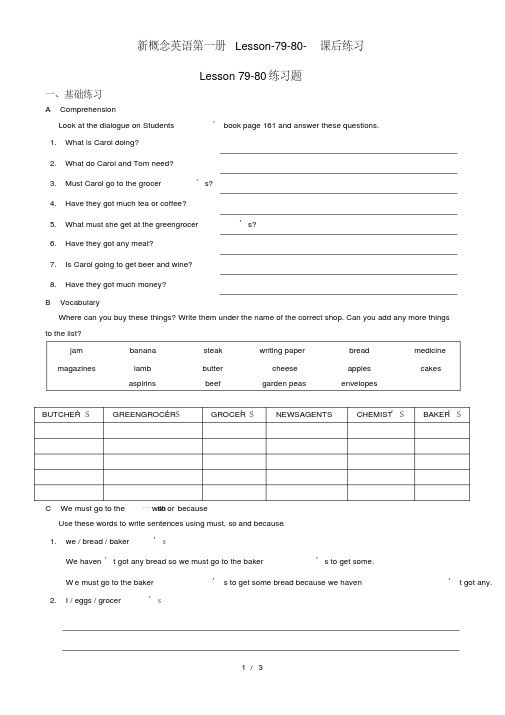
Lesson 79-80练习题一、基础练习A ComprehensionLook at the dialogue on Students’ book page 161 and answer these questions.1.What is Carol doing?2.What do Carol and Tom need?3.Must Carol go to the grocer’s?4.Have they got much tea or coffee?5.What must she get at the greengrocer’s?6.Have they got any meat?7.Is Carol going to get beer and wine?8.Have they got much money?B VocabularyWhere can you buy these things? Write them under the name of the correct shop. Can you add any more thingsto the list?jam banana steak writing paper bread medicine magazines lamb butter cheese apples cakesaspirins beef garden peas envelopesBUTCHER’SGREENGROCER’SGROCER’SNEWSAGENTS CHEMIST’SBAKER’Sso or becauseC We must go to the…withUse these words to write sentences using must, so and because.1.we / bread / baker’sWe haven’t got any bread so we must go to the baker’s to get some.W e must go to the baker’s to get some bread because we haven’t got any.2.I / eggs / grocer’s3.Carol / potatoes / greengrocer’s4.Tom / steak / butcher’s5.Tom and Carol / money / bankD About youWhat must you buy or get this week? Where? and when? Write five sentences like this.I must go to the newsagent’s tomorrow to get some envelopes.1. ______________________________________________________________2. ______________________________________________________________3. ______________________________________________________________4. ______________________________________________________________5. ______________________________________________________________二、实践拓展I.根据首字母和汉语提示写出相应的单词1. s___________购物单2. p___________土豆3. t___________西红柿4. w___________酒5. v___________蔬菜6. h___________希望7. n___________需要8. t___________东西9. m___________许多(修饰不可数名词)10. m___________许多(修饰可数名词)II.选择填空1.Are there ______ computer companies in your hometown?A. a lotB.lot ofC.muchD.lots of2.There isn’t ______ mineral water left. We have to buy another bottle.A. a lotB.manyC.muchD.lots of3.—Do you like this red car?—No, ______ .A.not soB.not at allC.littleD.few4.So ______ homework really makes the students feel tired.A.muchB.manyC.littleD.few5.I must go to the ______ to buy some meat.A.butchersB.butcher’sC.butchers’D.butcher6.There isn’t any milk ______ sugar. We need to buy some.A.andB.orC.withD.to7.We should eat more vegetables and fruit instead of ______ rich food.A.too muchB.much tooC.very muchD.very many8.I ______ you a happy journey.A.desireB.hopeC.wishD.regard9.The book ______ be John’s. It has his name on it.A.canB.mustC.needD.can’t10.Be careful! There is ______ traffic(交通).A.manyB.littleC.lessD. a lot ofIII.句型转换1.He has got much milk. (改为否定句)__________________________________________________________________2.They have got many bananas.(改为一般疑问句)__________________________________________________________________3.I’m making the bed.(就划线部分提问)__________________________________________________________________4.We need some potatoes.(就划线部分提问)__________________________________________________________________5.She often does some shopping on Sunday.(改为否定句)__________________________________________________________________IV.完成句子1.这周我们需要很多东西。
lesson79

[hEJp] [WI N] [5mQni]
v. 希望
n. 事情
muБайду номын сангаасh money
money
n. 钱
groceries
[5grEJsEriz]n. 食品杂货
[fru:t] n. 水果
fruit
n. stationery [5steIFEnEri] 文具 n. 报刊零售人 newsagent [5nju:z7eIdVEnt]
We haven’t got any meat at all. not… at all 一点也不 Yanhui doesn’t like oranges at all.
I hope that you’ve got some money. I hope that + … 我希望… Duoduo hopes that she can have much money.
1.When did your sister buy this pair of shoes? 2.What did they do this morning? 3.What color are your shoes? 4.Can you tell me which is the way to the park? 5.No,I can’t.
• • • • •
1.a forest 2.four bulls 3.do nothing 4.happy quarrel 5.bulls ate
homework
1. 听磁带第79课的单词及课文,3次/周, 每次30分钟 2. 背第79课的课文及笔记,背第79课的单 词,下次听写 3. 做练习册79和80的练习 4. 预习Lesson80、81
完整版新概念一册lesson79
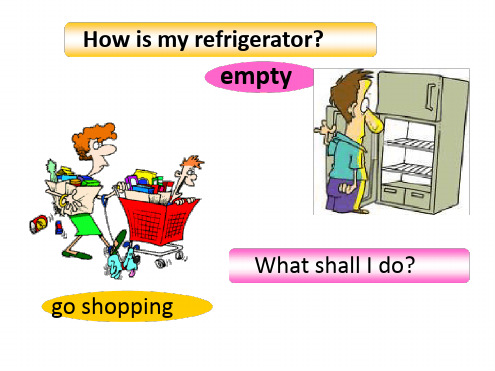
Listen to the flash and answer these questions.
Do they have any tomatoes? Must Carol go to the butcher's? Is Carol going to get any beer or wine?
Language Points
Listen to the teacher and make a shopping list for her
things
mince potatoes grapes
bread glue
place
butcher's greengrocer's greengrocer's
baker's stationary's
shopping list homework list
go doing 表示参加某种活动
go sleeping go swimming go working go fishing
I need a list of your name. Please make a list of things you must do. I must make a list of things to buy.
What do you need? I need you help.
Can you give me your hand ? I hope you can give me a hand.
restaurant ['restr?nt] n. 餐馆
Lesson 79 Carol's shopping list
? bread ? cakes
新概念英语第二册Lesson 79 (共65张PPT)

Grammar
Exercise 1
drinking – very little – a lot
A: John has been eating very little recently. B: So I noticed. He used to eat a lot.
Grammar
Exercise 1
New words and expressions
bomb n.
a bomb explodes/goes off 炸弹炸了
New words and expressions
bomb n.
drop a bomb 扔炸弹
New words and expressions
bomb n.
plant a bomb(leave a bomb somewhere) 放置炸弹
New words and expressions
frightened adj.
feeling afraid 害怕,担惊 把原本PPT占上
New words and expressions
be frightened of
翻译句子
I was frightened of being left by myself in the house.
curious adj.
Be less curious about people and more curious about ideas.
Madame Curie
New words and expressions
bomb n.
a weapon made of material that will explode 炸弹
New words and expressions
新概念第一册Lesson79PPT演示课件
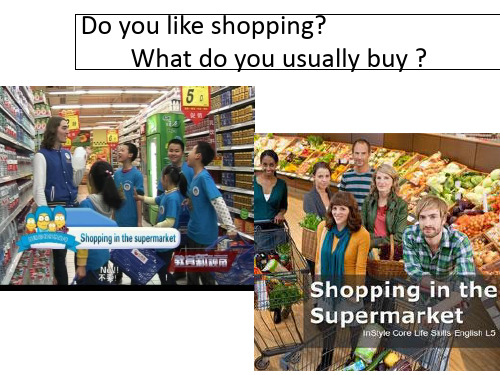
四、模仿例句改写一下句子
eg: I don’t have any eggs.
I haven’t got many eggs. He doesn’t have any coffee. He hasn’t got much coffee. • I don’t have any butter. I__h_a_ve_n_’__t_g_o_t _m_u_c_h_b_u_t_te_r_.________ 2.You don’t have any envelopes. Y_o_u__h_av_e_n_’_t__g_ot__m_a_ny__e_n_ve_l_op_e_s_. ____ 3.She doesn’t have any biscuits. S__he__h_a_sn_’__t_g_o_t_m_a_n_y_b_i_sc_u_it_s_. ______ 4.They don’t have any stationery. T__he_y__h_av_e_n_’_t__g_ot__m_a_n_y_s_ta_t_io_n_e_r_y_. __
tomatoes.
• What are the things Carol doesn’t have?
Sugar , jam and meat .
•2024/1/27
•35
TOM:What are you doing, Carol? CAROL:I‘m making a shopping list , Tom.
他们这周需要什么东西?
•2024/1/27
•39
1:need在否定句和疑问句中,跟动词原形. 2: need to在肯定句中,
need后只跟动词不定式,need to do sth
I needn't study. I don't need to study. Need you study? Do you need to study?
新概念英语第二册:Lesson79课文注释

【导语】《新概念英语》是1997年由外语教学与研究出版社和培⽣教育出版中国有限公司联合出版的⼀套英语教材。
作为⼀套世界闻名的英语教程,以其全新的教学理念,有趣的课⽂内容和全⾯的技能训练,深受⼴⼤英语学习者的欢迎和喜爱。
进⼊中国以后,《新概念英语》历经数次重印,以⼤限度地满⾜不同层次、不同类型英语学习者的需求。
为您整理了以下内容,仅供参考。
希望可以帮助到您!如果您想要了解更多相关内容,欢迎关注! 【篇⼀】 A flight attendent would take charge of me…我总是由⼀位空中乘务员照管…… would表⽰过去经常发⽣的事,它与 used to的区别参见第55 课语法。
take charge(of)为固定短语,表⽰“接管”、“开始管理”等: She took charge of the child after his parents died. 孩⼦的⽗母去世后,她接管了那孩⼦。
The new manager will take charge (of the company) from next week. 新经理从下星期开始管理公司。
【篇⼆】 …only on one occasion have I ever felt frightened.……只是有⼀次把我吓坏了。
这是⼀个倒装句。
倒装句的结构为“副词+助动词(be, do, have, can, must等)+主语+句⼦的其余部分”。
它通常⽤来加强语⽓,是典型的正式修辞和正式⽂体。
⽤倒装句的情况包括: (1)句⾸为否定或近似否定的副词(never, rarely, little, on no occasion, hardly, no sooner…than等): Never has he got so many letters. 他从未收到过这么多信。
Little does he realize how important this meeting is. 他对这个会议的重要性知之甚少。
- 1、下载文档前请自行甄别文档内容的完整性,平台不提供额外的编辑、内容补充、找答案等附加服务。
- 2、"仅部分预览"的文档,不可在线预览部分如存在完整性等问题,可反馈申请退款(可完整预览的文档不适用该条件!)。
- 3、如文档侵犯您的权益,请联系客服反馈,我们会尽快为您处理(人工客服工作时间:9:00-18:30)。
many flowers there.
3. a lot of
• a lot of=lots of 意为“许多” • 既可修饰可数名词,也可以修饰不可数名词, 多用于肯 定句 • We have a lot of books/pens/cabbages • He needs a lot of water/meat/jam • much和many 也可表示“许多” • much 只能修饰不可数名词 一般用于否定句和疑问句中 • We don't need much tea/ sugar/coffee • many 只能修饰可数名词 一般用于否定句和疑问句中。 • He doesn't have many tomatoes/ vegetables/
胜利的
monkey 猴子
看到
去掉k
money
猴子不是猴王(K)就不值钱了。,
Unit 40
英语小贴士
a lot of & much & many 许多
1. many只能修饰可数名词;
2. much只能修饰不可数名词;
3. a lot of既可以修饰可数名词,也可以修饰不可数名词; a lot of 只能用于肯定句中,在变疑问句和否定句时, 则要换成many或much。 There are a lot of trees in the garden, but there aren’t
3
1. shopping list
• make a shopping list • 写购物单 • Let's make a shopping list. • 我们写个购物单。
shop / storeΒιβλιοθήκη shopping center
shop / go shopping / do some shopping
情态动词 实义动词 实义动词 实义动词 主语是 人 主语是 物
I need to buy a present for my mother. The door needs mending. The door doesn’t need mending. Your father needn’t help. Your father doesn’t need help.
grocery
食品杂货店
y-i+es
groceries
station 车站 news 新闻 v ege
ery 后缀(表地方) a 一个 table 桌上
stationery 车站这个地方是卖文具的
gent 绅士
newsagent
新闻是一个绅士提供给报刊零售人的
vegetable 成功的看到了桌上的蔬菜
CAROL: We
CAROL: I
must go to the grocer's. jam.
完整句: I must go to the grocer’s to get some groceries. We haven't got much tea or coffee, grocer’s:sugar, jam, cheese, butter, honey, biscuit 肯定句中表示“和”,用“ ”; and we haven't and got any sugar or 否定句中表示“和”,要用“or”代替“and”。 I like reading and dancing, but I don’t like singing or dancing.
实义动词
hope 希望
• • • • I hope that +句子: 我希望.... I hope that you have got some money. 我希望我能成为一名教师。 I hope that I can become a teacher.
• 如果希望做某事,hope后面要接动词,应接动词 的什么形式?看下面这个句子: • He hopes to become a doctor. • hope to do.
Everyday English
1. You look beautiful tonight. 今晚你看上去真美啊!
2. Don’t bother me! 别烦我! 3. Rich and willfull. 有钱就是任性!
Lesson 79
Carol’s shopping list
Shopping list 购物单
have got 的第三人称单数has got
• • • • • • • • 他有许多马铃薯。 He has got a lot of potatoes. 否定句: He hasn't got many potatoes. 一般疑问句: Has he got many potatoes? 回答: Yes, he has./No, he hasn't.
• grocer 杂货商 greengrocer蔬菜水果商 • the grocer's (shop)/greengrocer's (shop) • 食品店/蔬果店
表示店铺、医院、学校、住宅、及公共建筑时,名 词所有格后常常不出现修饰的名词。 at the butcher's 在肉店
at the dentist's 在牙科 at the stationer's(在文具店) at the bookseller's 在书店
Pattern Drill
Lesson 79-80 学习重点
1. much和many;have 和have got;must和need
2. the + 名词所有格
hopeful
• hopeless
thing n.事情
• • • • • • • • no-thing nothing pron. 没有东西 any-thing anything pron. 任何东西 some-thing something pron. 某事;某物 every-thing everything pron. 每件事,一切
TOM:
I hope that you've got some money.
haven't got much. Well, I haven't got much either!
CAROL: I TOM:
Lesson 80
I must go to the …
New words and expressions
Money talks. (谚语:有钱能 使鬼推磨)
money
pocket money
零花钱
New words and expressions
grocer
groceries
at the grocer’s
fruit
stationery
at the stationer’s
stationer
chemist at the chemist’s chemistry
need 用法小结:
• need sth.需要某物(其后的宾语可以是名词, 也可以是代词。) • need doing. • 有必要做某事need to do sth.(作为实义动 词,要接带to的动词不定式,表示有义务或 责任去做某事)需要做某事。 • 注意:need 作情态动词讲没有肯定句形式。
shopping mall
时态造句:
1. 我每个星期日写购物单。 2. 我爸爸每个星期六写购物单。 3. 他们昨天写了购物单。 4. 学生们正在写购物单。 5. 你必须为我写份购物单。
6. Linda可以为你写份购物单。
7. 我们打算写购物单。
vegetables
vegetable oil
vegetarian
but we've got a lot of potatoes.
CAROL: I
must go to the butcher's, too.
mutton, pork
butcher’s :meat, lamb, beef, steak, mince, chicken, We need some meat.
5.have got
• have got 与 have 意思一样,都是“有”的 意思,但两者有区别 • have 可以用于任何场合 • have got 通常用于口语等非正式的环境中。 • have ----don't have 没有 • We don't have much money. • have got---haven't got 没有 • We haven't got much money.
We haven't got any meat at all.
在否定句的末尾加上at all,用来加强否定的语气, 相当于中文的“一点也不”“根本不”。
TOM:
Have we got any beer and wine? No, we haven’t. And I'm not going to get any!
TOM:
What about vegetables? must go to the greengrocer's.
CAROL: I
greengrocer’s tomato, potato, cabbage, lettuce, pea, bean We: haven't got many tomatoes,
• 此为,have 的一般疑问句需要借助助动词do或 者did • We have some meat in the refrigerator. • 一般疑问句: • Do you have any meat in the refrigeratior? • 回答: Yes, we do./ No, we don't. • 而 have got 的一般疑问句直接将have 提前放句 首 • We have got some meat in the refrigerator. • Have you got any meat in the refrigerator? • 回答: Yes, we have./No, we haven't.
